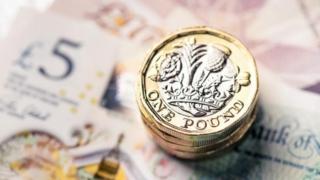Record UK government surplus in January

Image copyright
Getty Images
Britain’s public finances have received a big boost ahead of the chancellor’s Spring Statement next month.
Income from taxes beat public spending by £14.9bn in January, the largest monthly surplus since records began in 1993, official figures showed.
The bumper surplus beat economists’ forecasts of £10bn, and was £5.6bn greater than January 2018.
January is a key revenue-raising month as it is when taxpayers submit their self-assessment returns.
Analysts said the reduction in borrowing should give Chancellor Philip Hammond extra money for his next economic update in the spring, amid acute Brexit concerns.
Howard Archer, chief economic adviser to the EY Item Club, said: “A record high surplus on the January public finances provides a much-needed welcome boost for Chancellor Philip Hammond as he faces a worrying backdrop to his Spring Statement on 13 March.
“With the economy clearly struggling early on in 2019 after a sharp slowdown in the fourth quarter of 2018 and the Brexit situation highly uncertain, the chancellor will have a lot on his mind when he presents the Spring Statement.
“It looks highly likely that he will have to announce downgraded growth forecasts from the OBR [Office for Budget Responsibility] at least for the near term, with possible negative ramifications for expected budget deficits.”
Office for National Statistics (ONS) data also showed that borrowing in the current financial year to January was £21.2bn, £18.5bn less than the same period last year and the lowest year-to-date figure for 17 years.
The ONS added that public sector net debt increased by £40.5bn to £1.8tn in January, equivalent to 82.6% of gross domestic product (GDP).

